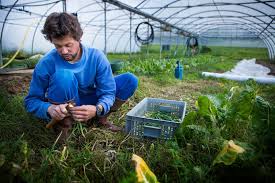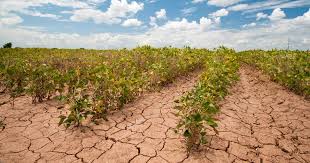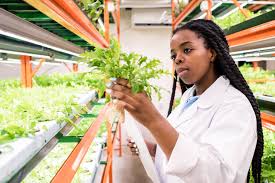Agricultural research is a crucial part of farming that aims to improve the way we grow crops and raise animals. It involves studying various aspects of agriculture, including plant and animal genetics, pest control, soil health, and climate impact.
The primary goal is to enhance food production, ensure food security, and promote sustainable farming practices. This article will guide you through the essential elements of agricultural research, focusing on its objectives, methods for enhancing crop yields, developing disease-resistant varieties, and promoting sustainable farming practices.
Agricultural research can be defined as the systematic investigation of agricultural issues to develop new technologies, practices, and policies. It has several important objectives:
1. Improve Crop Yields: Research aims to increase the amount of food produced per unit of land, which is essential to feed the growing global population.
2. Develop Resistant Varieties: Researchers work to create crop varieties that can resist diseases, pests, and adverse weather conditions, ensuring better harvests.
3. Enhance Soil Health: Understanding soil biology and chemistry helps improve soil fertility and structure, leading to healthier plants.
4. Promote Sustainable Practices: Agricultural research encourages practices that protect the environment while maintaining productivity.
5. Address Climate Change: Researchers study the impact of climate change on agriculture and develop strategies to mitigate its effects.
How Agricultural Research Works

1. Identifying Problems: Researchers start by identifying specific challenges in agriculture, such as low crop yields or pest infestations.
2. Formulating Hypotheses: Once a problem is identified, researchers formulate hypotheses that suggest potential solutions or improvements.
3. Conducting Experiments: Experiments are designed to test these hypotheses, which may involve growing different crop varieties under controlled conditions or applying new farming techniques.
4. Analyzing Data: After conducting experiments, researchers analyze the data to determine the effectiveness of their methods.
5. Sharing Findings: Finally, researchers share their findings through publications, workshops, and outreach programs to help farmers adopt new practices.
Enhancing Crop Yields Through Research
Enhancing crop yields is one of the primary focuses of agricultural research. Here are some key strategies that researchers use:
1. Genetic Improvement: Research in plant genetics aims to develop crop varieties that produce more food, utilizing methods such as selective breeding (choosing parent plants with desirable traits to produce offspring with improved characteristics) and genetic modification (directly altering the genes of plants to enhance traits like yield, pest resistance, or drought tolerance).
2. Precision Agriculture: This approach uses technology to optimize field-level management through GPS technology (applying fertilizers and pesticides more precisely, reducing waste and increasing efficiency) and drones and sensors (monitoring crop health and soil conditions to allow farmers to make informed decisions).
3. Innovative Farming Practices: Research often leads to the development of new farming practices that can increase yields, such as crop rotation (changing the type of crop grown in a field from year to year to maintain soil fertility and reduce pests) and intercropping (growing two or more crops together to maximize land use and enhance yields).
Development of Disease-Resistant Varieties
One of the significant achievements of agricultural research is the development of disease-resistant crop varieties. This helps reduce crop losses and ensures food security. Here’s how researchers accomplish this:
1. Understanding Plant Diseases: Researchers study how diseases affect plants, identifying the pathogens responsible and how they spread.
2. Identifying Resistance Genes: Scientists look for genes in plants that confer resistance to diseases, which can be native to the plant (some plants naturally possess resistance to certain diseases) or introduced from other species (transferring resistance genes from one plant species to another through breeding or genetic engineering).
3. Breeding Programs: Breeding programs focus on creating new varieties with enhanced disease resistance through crossbreeding (combining different plant varieties to produce offspring with the desired traits) and marker-assisted selection (using genetic markers to identify plants with desirable traits early in the breeding process).
4. Field Trials: After developing new varieties, researchers conduct field trials to test their performance against diseases, involving planting trials (growing the new varieties alongside susceptible ones to compare their performance) and monitoring disease levels (regularly assessing disease levels in the crops to evaluate resistance).
5. Farmer Collaboration: Successful disease-resistant varieties are shared with farmers through extension programs, helping farmers adopt new varieties and improve their yields.
Read Also: Treatment of Ciliated Protozoan Infections in Fishes
Sustainable Farming Practices and Agricultural Research

Sustainable farming practices are essential for ensuring long-term food security and protecting the environment. Agricultural research plays a key role in promoting these practices. Here’s how:
1. Soil Conservation: Research emphasizes practices that protect and enhance soil health, including cover cropping (planting cover crops to prevent soil erosion and improve soil fertility) and reduced tillage (minimizing tillage to preserve soil structure and reduce erosion).
2. Water Management: Efficient water use is crucial for sustainable agriculture. Research has led to methods like drip irrigation (delivering water directly to plant roots to reduce waste and conserve water) and rainwater harvesting (collecting and storing rainwater for irrigation to reduce dependency on groundwater).
3. Integrated Pest Management (IPM): IPM combines biological, cultural, and chemical practices to manage pests sustainably, which includes monitoring (regularly checking for pests and diseases to determine when control measures are needed), biological control (using natural predators to control pest populations), and cultural practices (rotating crops, adjusting planting dates, and improving sanitation to prevent pest outbreaks).
4. Agroforestry: Integrating trees and shrubs into crop and livestock systems can enhance biodiversity, improve soil health, and increase resilience to climate change.
5. Farmer Education and Training: Agricultural research often includes programs to educate farmers about sustainable practices, such as workshops and demonstrations (conducting hands-on training sessions to show farmers how to implement sustainable practices) and resource materials (providing guides, pamphlets, and online resources to help farmers learn about new techniques).
Role of Agricultural Research in Food Security
Agricultural research plays a critical role in ensuring food security around the world. As the global population continues to grow, the demand for food increases, putting pressure on agricultural systems. Research helps address this challenge through various means:
1. Increasing Productivity: Research focuses on developing higher-yielding crop varieties and improving livestock production. This helps farmers produce more food on the same amount of land.
2. Developing Sustainable Practices: Research promotes sustainable farming methods that maintain soil health, conserve water, and reduce chemical use. Sustainable practices help ensure long-term food production without harming the environment.
3. Enhancing Resilience to Climate Change: Agricultural research aims to develop crops and farming techniques that can withstand extreme weather conditions. This includes drought-resistant crops and practices that reduce vulnerability to floods.
4. Reducing Post-Harvest Losses: Research helps develop better storage and processing techniques to minimize food waste after harvest. Improved logistics and handling can ensure more food reaches consumers.
5. Supporting Policy Development: Research provides the data and evidence needed for policymakers to make informed decisions about agriculture and food systems. This can lead to better support for farmers and more effective food security programs.
Innovations in Pest and Weed Management
Effective pest and weed management is essential for maintaining agricultural productivity. Research has led to several innovative strategies to manage these challenges sustainably:
1. Integrated Pest Management (IPM): IPM combines biological, cultural, and chemical methods to control pests effectively while minimizing harm to the environment. This approach includes practices like crop rotation, introducing beneficial insects, and applying pesticides only when necessary.
2. Genetically Modified Organisms (GMOs): Research has produced genetically modified crops that are resistant to specific pests and diseases. These crops require fewer pesticide applications, leading to lower costs for farmers and reduced environmental impact.
3. Biopesticides: These are natural pesticides derived from plants, bacteria, or minerals. Research has shown that biopesticides can be effective in controlling pests while being less harmful to beneficial insects and the environment.
4. Precision Agriculture: This technology uses data and analytics to monitor pest populations and apply treatments more effectively. Drones, sensors, and GPS technology help farmers target pest control measures precisely where they are needed.
5. Weed Management Innovations: Research into cover cropping and mulching helps suppress weed growth naturally. These practices improve soil health while reducing the need for chemical herbicides.
Read Also : The External Anatomy of Cartilaginous Fish
Impact of Climate Change on Agriculture

Climate change poses significant challenges to agriculture, affecting crop yields and food production. Agricultural research helps address these issues through various strategies:
1. Understanding Climate Effects: Research investigates how climate change affects crop growth, pest behavior, and soil health. Understanding these impacts is essential for developing effective adaptation strategies.
2. Developing Resilient Crop Varieties: Researchers are breeding crops that can tolerate higher temperatures, drought, and flooding. These resilient varieties are crucial for maintaining food production in changing climates.
3. Climate-Smart Agriculture: This approach involves practices that increase productivity while reducing greenhouse gas emissions. Research focuses on agroforestry, improved water management, and efficient fertilizer use to promote climate-smart practices.
4. Early Warning Systems: Research helps develop systems to monitor and predict climate-related events, such as droughts and floods. These systems provide farmers with critical information to make informed decisions and mitigate risks.
5. Policy Recommendations: Research informs policymakers about the impacts of climate change on agriculture and provides recommendations for support programs to help farmers adapt to changing conditions.
Agricultural Research and Soil Health
Soil health is fundamental to sustainable agriculture. Research plays a vital role in understanding and improving soil health through the following means:
1. Soil Fertility Management: Research identifies the best practices for maintaining soil fertility, including the use of organic matter, cover crops, and crop rotations. Healthy soil is essential for high crop yields.
2. Soil Erosion Prevention: Studies help develop methods to prevent soil erosion, such as contour farming (plowing along the contours of the land) and the use of buffer strips (vegetation planted to protect soil from erosion).
3. Understanding Soil Microbiology: Research into soil microbes reveals their crucial role in nutrient cycling and plant health. Understanding these relationships helps improve soil management practices.
4. Soil Conservation Techniques: Researchers develop techniques like reduced tillage and no-till farming, which help preserve soil structure and prevent erosion while promoting soil health.
5. Soil Testing and Analysis: Agricultural research promotes the importance of soil testing to understand nutrient levels and pH. This knowledge helps farmers make informed decisions about fertilization and soil amendments.
Technological Advancements in Agriculture
Technological advancements have revolutionized agriculture, improving efficiency and productivity. Agricultural research drives these innovations through various avenues:
1. Precision Agriculture Technologies: Farmers now use GPS and remote sensing technologies to monitor crops and optimize inputs, leading to more efficient use of resources. This includes variable rate application of fertilizers and pesticides based on soil and crop needs.
2. Drones and Robotics: Drones are used for crop monitoring, pest detection, and even planting seeds. Robotics are increasingly being used for tasks like harvesting and weeding, reducing labor costs and increasing efficiency.
3. Data Analytics and Artificial Intelligence (AI): AI and data analytics help farmers make better decisions by analyzing large amounts of data, predicting yields, and suggesting optimal planting times and resource allocation.
4. Biotechnology: Advances in biotechnology allow for the development of improved crop varieties with enhanced traits, such as drought tolerance and pest resistance. These innovations contribute to food security.
5. Mobile Technology: Mobile apps provide farmers with information on weather forecasts, market prices, and best practices. This access to information helps farmers make informed decisions to improve their yields and profitability.
Economic Benefits of Agricultural Research
Agricultural research plays a significant role in the economy by enhancing productivity, creating jobs, and fostering innovation. Here are some of the economic benefits associated with agricultural research:
1. Increased Productivity: Research leads to the development of higher-yielding crop varieties and improved farming practices. This increase in productivity helps farmers produce more food on the same amount of land, leading to higher incomes.
2. Job Creation: Agricultural research fosters innovation and supports the growth of related industries, such as food processing, equipment manufacturing, and distribution. This growth creates jobs both on farms and in other sectors.
3. Reduced Production Costs: Innovations in agriculture can help reduce the costs of inputs such as fertilizers, pesticides, and water. More efficient practices lead to lower production costs, increasing farmers’ profit margins.
4. Enhanced Food Security: By improving crop yields and developing sustainable practices, agricultural research contributes to food security. A secure food supply stabilizes markets and supports economic growth.
5. Export Opportunities: Increased agricultural productivity allows countries to produce surplus food, leading to export opportunities. This can improve trade balances and contribute to national economies.
Collaboration Between Researchers and Farmers
Collaboration between researchers and farmers is vital for the success of agricultural research. This partnership helps ensure that research is relevant and practical. Here’s how this collaboration works:
1. Identifying Needs: Farmers provide valuable insights into the challenges they face in the field, helping researchers identify priority areas for research. This input ensures that research efforts address real-world issues.
2. Participatory Research: Collaborative research involves farmers in the research process. This can include on-farm trials, where farmers test new techniques or crop varieties alongside researchers. Their feedback is crucial for refining practices.
3. Knowledge Sharing: Researchers and farmers share knowledge and experiences, leading to better understanding and implementation of new practices. Workshops, field days, and extension services facilitate this knowledge exchange.
4. Technology Transfer: Researchers often develop new technologies and practices that need to be transferred to farmers. Collaborations help ensure that farmers understand how to use these innovations effectively.
5. Strengthening Community Resilience: By working together, researchers and farmers build stronger communities capable of adapting to challenges such as climate change, pests, and market fluctuations.
Policy Implications of Agricultural Research
Agricultural research has significant implications for policy-making. Understanding these implications can help shape effective agricultural policies. Here are some key areas where research impacts policy:
1. Evidence-Based Decision-Making: Agricultural research provides the data and evidence needed for policymakers to make informed decisions about agricultural practices, funding, and support programs.
2. Funding Allocation: Research findings help guide the allocation of resources to priority areas, ensuring that funding is directed toward initiatives that will have the most significant impact on food security and agricultural sustainability.
3. Regulatory Frameworks: Research informs the development of regulations related to biotechnology, pesticide use, and environmental protection. Policymakers rely on research to create frameworks that ensure food safety and environmental sustainability.
4. Climate Change Adaptation: Agricultural research helps identify strategies for adapting to climate change. Policymakers can use this information to support programs that help farmers implement sustainable practices and develop resilient crops.
5. Rural Development Programs: Research findings can inform rural development initiatives, ensuring that programs address the unique challenges faced by rural communities. This may include supporting smallholder farmers and promoting agroecological practices.
Do you have any questions, suggestions, or contributions? If so, please feel free to use the comment box below to share your thoughts. We also encourage you to kindly share this information with others who might benefit from it. Since we can’t reach everyone at once, we truly appreciate your help in spreading the word. Thank you so much for your support and for sharing!

